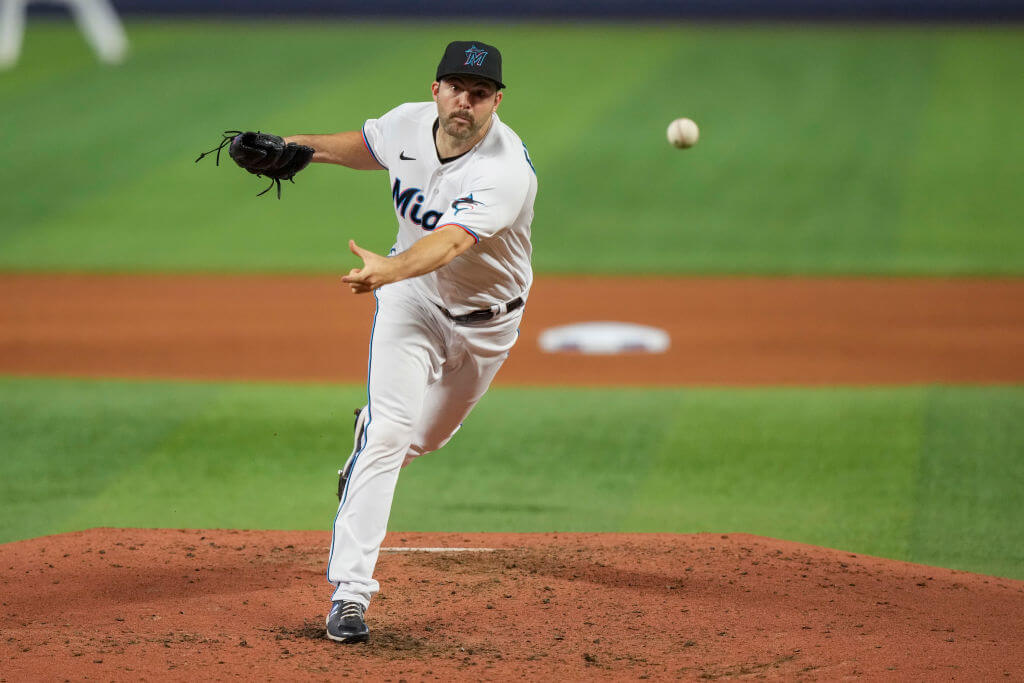Slow fastballs, tech wizardry and the perfect name: Meet the newest Jewish major leaguer
Jake Fishman’s heater may not touch 90, but it was effective in his MLB debut

Jake Fishman of the Miami Marlins throws a pitch in his major league debut against the New York Mets. Photo by Eric Espada/Getty Images
Until recently, Jake Fishman was known more as an IT whiz than for his unorthodox fastball.
“I’ve always been a person that people come to for technology problems,” Jake Fishman told a local news channel in May. At the time, Fishman was pitching for the Miami Marlins’ Triple-A affiliate, and his IT-focused YouTube channel, “Fish Tech,” was supplementing his income.
But in Fishman’s major league debut Sunday, he was the one creating technical difficulty — with a fastball so slow MLB’s pitch-tracking system thought it was a changeup.
Whatever you want to call his 87-mph two-seamer — Fishman calls it a sinker — it seemed to work.
With family and friends in attendance, Fishman, who is Jewish and pitched for Team Israel at last year’s Olympics, spun the sinker and his curveball into 10 outs Sunday against the New York Mets, allowing one run. It’s about as good an outing as a long reliever could ask for, much less for a major league debut.
“Honestly I thought it went really well,” Fishman said Monday in an interview. “I was really happy with how many strikes I threw and attacked the guys.”
The Marlins’ social media team was quick to capitalize on their newest player’s perfect name:
last name says it all. newest FISHman@budweiserusa // #MakeItMiami pic.twitter.com/cEzbseq0fE
— Miami Marlins (@Marlins) July 31, 2022
His call-up was a short one, however, as the Marlins designated Fishman for assignment on Monday — which gives other teams the opportunity to claim him off waivers before he can be demoted to the minors — to make room on the roster for a player returning from injury.
Road to The Show
Fishman grew up in Sharon, Massachusetts, where he attended Temple Klal Yisrael’s Hebrew school. He was also bar mitzvahed at the synagogue.
After he was passed over for athletic scholarships coming out of Sharon High School, he enrolled at Division III Union College, in Schenectady, New York. All Fishman did there was lead college baseball with a 0.41 earned-run average — and take a few computer science courses that would come in handy later. When the Toronto Blue Jays picked him in the 30th round of the 2016 draft, he became the first player drafted in the school’s history.
Six years later, Fishman is one of only a handful of Division III alumni in the bigs.
“It just feels amazing, to be honest,” Fishman said about the callup. “You spend so much time in the minor leagues, and it all builds to this moment.”
Debut

Fishman took the mound with two on and two out in the third inning — the Marlins’ starting pitcher had already given up six runs — where he faced Mets all-star shortstop Francisco Lindor.
“Your first major league batter you’re not really expecting Francisco Lindor is going to be at the plate with the guy on first and second,” he said, adding that he was “a bit shaky” when he first looked into the batter’s box. “Then when I threw that first pitch for a strike, I was like, ‘All right, I think we’re gonna be okay.’”
His third pitch, clocked at 87 mph, was originally registered as a changeup by Statcast, MLB’s pitch-tracking technology.
But Statcast was confused — that’s actually about the average speed of Fishman’s heater, which topped out yesterday at a leisurely 89.1 mph. For comparison, the average speed of an MLB fastball in 2021 was 93.5.
Statcast is tracking Jake Fishman's fastball as a changeup ?
— Fish Stripes (@fishstripes) July 31, 2022
Only high-80s velo with low spin, but that's his heater pic.twitter.com/oCaWuWjGXa
How does the 6’3” lefty get batters out? Fishman relies on deception, turning his back to home plate during his delivery and hiding the ball until the last second, when he wheels and throws it sidearm.
According to Fishman, the Marlins don’t value fastball velocity as much as release height and downward movement — where his sinker excels.
“For probably half of my career, velocity was a huge concern for me,” he said, “until the analytics started coming out and saying that ‘Wait, these guys have really great fastballs.’ Even though it might not be 100, it’s got the movement profile to be effective.”
Fishman was called up to a Marlins team that is 17.5 games out of first place, and he is unlikely to be moved to a contender before Tuesday’s trade deadline — though another Jewish reliever, Scott Effross, was acquired Monday by the Yankees.
But the quality of his debut is a good sign for Team Israel, which has strong hitting depth but is shallow in the bullpen. And despite his rookie status in the majors, Fishman will bring something that some players on the World Baseball Classic team may lack — tournament experience.
As for his tech wizardry, the rigors of his major league assignment may put any new tool tips on hold. In the meantime, you can download his most successful creation — an audio visualizer for the Macbook Pro touchbar — for just $4.99.
The Forward is free to read, but it isn’t free to produce

I hope you appreciated this article. Before you go, I’d like to ask you to please support the Forward.
Now more than ever, American Jews need independent news they can trust, with reporting driven by truth, not ideology. We serve you, not any ideological agenda.
At a time when other newsrooms are closing or cutting back, the Forward has removed its paywall and invested additional resources to report on the ground from Israel and around the U.S. on the impact of the war, rising antisemitism and polarized discourse.
This is a great time to support independent Jewish journalism you rely on. Make a gift today!
— Rachel Fishman Feddersen, Publisher and CEO
Support our mission to tell the Jewish story fully and fairly.
Most Popular
- 1

Culture Cardinals are Catholic, not Jewish — so why do they all wear yarmulkes?
- 2

Fast Forward Ye debuts ‘Heil Hitler’ music video that includes a sample of a Hitler speech
- 3

News School Israel trip turns ‘terrifying’ for LA students attacked by Israeli teens
- 4

Fast Forward Student suspended for ‘F— the Jews’ video defends himself on antisemitic podcast
In Case You Missed It
-

Yiddish קאָנצערט לכּבֿוד דעם ייִדישן שרײַבער און רעדאַקטאָר באָריס סאַנדלערConcert honoring Yiddish writer and editor Boris Sandler
דער בעל־שׂימחה האָט יאָרן לאַנג געדינט ווי דער רעדאַקטאָר פֿונעם ייִדישן פֿאָרווערטס.
-

Fast Forward Trump’s new pick for surgeon general blames the Nazis for pesticides on our food
-

Fast Forward Jewish feud over Trump escalates with open letter in The New York Times
-

Fast Forward First American pope, Leo XIV, studied under a leader in Jewish-Catholic relations
-
Shop the Forward Store
100% of profits support our journalism
Republish This Story
Please read before republishing
We’re happy to make this story available to republish for free, unless it originated with JTA, Haaretz or another publication (as indicated on the article) and as long as you follow our guidelines.
You must comply with the following:
- Credit the Forward
- Retain our pixel
- Preserve our canonical link in Google search
- Add a noindex tag in Google search
See our full guidelines for more information, and this guide for detail about canonical URLs.
To republish, copy the HTML by clicking on the yellow button to the right; it includes our tracking pixel, all paragraph styles and hyperlinks, the author byline and credit to the Forward. It does not include images; to avoid copyright violations, you must add them manually, following our guidelines. Please email us at [email protected], subject line “republish,” with any questions or to let us know what stories you’re picking up.















